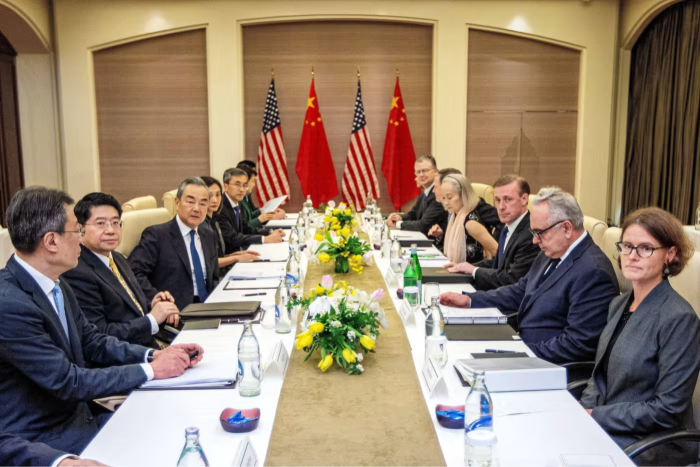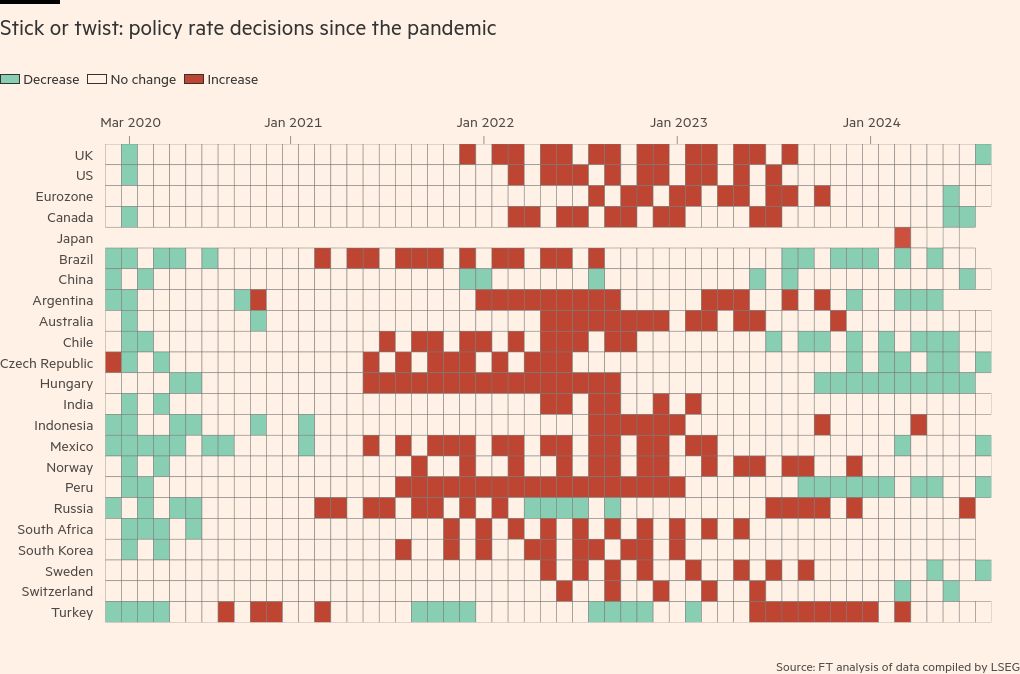
This article is an on-site version of our FirstFT newsletter. Subscribers can sign up to our Asia, Europe/Africa or Americas edition to get the newsletter delivered every weekday morning. Explore all of our newsletters here
Good morning. Today we’re covering:
-
Slowing dealmaking in China
-
The inside story of a secret US-China backchannel
-
South-east Asia’s nepo baby leaders
But first we go to the Middle East, where Israel’s military launched a wave of air strikes in southern Lebanon early yesterday, in what it said was an attempt to foil an “extensive attack” by Hizbollah.
The exchange of fire was the biggest between Israel and the Iran-backed militant group since they fought a 34-day war in 2006. It marked a sharp escalation of the hostilities between the two sides since the start of the Israel-Hamas war in Gaza last year.
Hassan Nasrallah, Hizbollah’s leader, sought to draw a line under the exchange yesterday evening, saying the attack was over, although its impact would still have to be assessed.
“If the result is satisfactory and the intended goal is achieved, we will consider the response operation has ended,” Nasrallah said in a televised address. “If the result is not enough, we will reserve the right to respond at another time.” Here’s how the attacks unfolded.
Thanks for reading FirstFT. Do you have questions about this latest escalation in the Middle East or the Israel-Hamas war? Email us at [email protected] or hit “reply” and remember to include your name and where you’re writing from. We’ll answer as many as possible in a special weekend edition of the newsletter.
Here’s what else I’m keeping tabs on today:
-
Economic data: Singapore publishes its July industrial production index and Thailand reports trade data.
-
Pacific Islands: Leaders of Pacific nations gather in Tonga for an annual summit, where climate change and security are likely to dominate discussions amid US-China competition in the region. (Reuters)
-
Philippines: Financial markets are closed for National Heroes Day.
Five more top stories
1. Most of the world’s biggest private equity firms have put the brakes on deals in China this year as geopolitical tensions rise and Beijing exerts tighter control over business. Just five new investments have been made in the world’s second-largest economy — mostly small — by the 10 largest global buyout firms this year, according to figures from Dealogic.
2. Russian lawmakers have hit back at the arrest of Telegram chief executive Pavel Durov in France for failing to moderate criminal activity adequately on his messaging platform. Durov’s positioning of Telegram as a censorship-resistant messaging platform has drawn scrutiny, with researchers warning that it has become a haven for criminals and hackers.
3. German police have arrested a man suspected of killing three people and wounding eight others during a knife attack in the west German city of Solingen on Friday in an incident authorities said was an act of terrorism.
4. Y Combinator, the San Francisco start-up incubator that launched Airbnb, Reddit, Stripe and Coinbase, is backing a weapons company for the first time. Ares Industries, which launched last week, has pitched its “low-cost cruise missiles” as suited for use in a potential war between the US and China in the Taiwan Strait.
5. Kamala Harris has raised more than $500mn since replacing Joe Biden in the White House race. The US vice-president’s campaign said grassroots donations had been “unprecedented” during last week’s Democratic National Convention, with a third of those coming from first-time contributors.
The Big Read

On Tuesday, Jake Sullivan makes his first visit to China as US national security adviser to meet Chinese foreign minister Wang Yi. But it will not be their first meeting — Sullivan and Wang have held several secret rendezvous around the world since May 2023 as part of a “strategic channel” aimed at stabilising US-China relations. Based on interviews with officials from both countries, today’s Big Read recounts how the secret backchannel came about — and the details of how it operated.
We’re also reading . . .
-
South-east Asia’s nepo baby leaders: From Thailand to Indonesia, political dynasties illustrate the region’s failure to build robust and effective institutions, writes Ben Bland.
-
South Korea: The country’s espionage agencies generally operate in the shadows, but recent failures have cast their operations in an unflattering light.
-
Who really murdered Pier Paolo Pasolini? FT Magazine has the story on one man’s unending mission to solve the mysterious and brutal killing of the Italian film director.
Chart of the day
Central bankers left the Kansas City Fed’s annual Jackson Hole symposium cautiously optimistic about achieving a soft landing for the global economy. Still, officials are aware of the challenges ahead — notably pacing their interest rate cuts right.

Take a break from the news
Hidden in the hills of Japan’s Toyama Prefecture, a cluster of villages is clinging to the ancient tradition of thatching. In a nation better known for futuristic cities, the thatched houses of Gokayama offer a rare snapshot of pre-industrial Japanese rural life.
